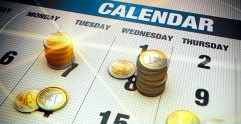Overview over Special Economic Events
The economic calendar is formed out of economic news that is released monthly, and traders all over the world should be aware of its capacity to move markets. It is said that technical analysis shows the direction the market is going to move in, while fundamental analysis gives the reasons for the move. However, not all events that are marked on the economic calendar are economic news. It so happens that from time to time that the market is focusing on something else rather than the economy. The fundamental analysis article we’ve covered here on the Forex Trading Academy shows the type of other news we may expect, but the purpose of this article here is to list some of them and to briefly cover their importance. What needs to be considered here is that there is no clear rule regarding how the market is going to move on such events. Because of this uncertainty, they are marked with red in the economic calendar, which means that volatility will probably rise. Any piece of data that is marked with the colour red is one that warrants deep consideration before opening a trade on the Forex market, among others.
| Broker | Bonus | More |
|---|
Events That Influence Trading

Elections and Referendums
Every 4 or 5 years, political elections take place in all democracies. When this happens in a top-performing economy, markets are interested to know what the likely outcome is, and how the business environment is going to change. Election dates are known in advance, and this means that market participants will prepare in advance for the event. However, it doesn’t mean that the actual move that the market will make on the event is going to be the one that it is expected. Perhaps the best example comes from the US presidential election that just took place this November. Markets knew that an important event was going to impact on rates, and it all came down to two candidates with two different economic agendas. The expectations were that if Mr Trump was going to win the White House, this was going to be a risk-off event, with USD/JPY, USD/CHF, and equities around the world moving lower. The reason for such expectations was the fact that Mr Trump’s political agenda was full of uncertainties, and protectionism was favoured, which should have led to risk aversion. As such, all pieces of information prior to the actual vote were showing the same market reaction: USD/JPY had been bought on the news that Trump is losing ground, and the other way around. And then the vote came. While the initial reaction was as expected, it only lasted for a few hours, as a massive rally started in the JPY pairs and in the US equities. This shows that preparation for such important events is one thing, and actual trading is another one. Referendums play an important role in increasing market volatility, as no-one knows what the outcome will be after such popular scrutiny; and, moreover, no one knows how the market will react to the outcome. The Brexit vote is the classical example, and the upcoming Italian constitutional referendum is another one that comes to mind.
Fed’s Chairman/Chairwoman Semiannual Testimony
Part of the Fed Chairman’s/Chairwoman’s job is to testify twice a year, once in the Spring and another time in the Fall, in front of the Senate and the Economic Committee. The idea behind these testimonies is for the policymakers to scrutinise the state of the economy, and from them traders gain an idea about what the next steps for US monetary policy will be. These testimonies are held in the same week, and the biggest reaction is when the questions and answers session starts. While some questions may be known, no one knows the answers, so volatility is on the rise. The European counterparts used this as an example, and now the President of the European Central Bank (ECB) testifies in front of the European Parliament, following the same principle as the one explained earlier. Again, the reason for these testimonies is more transparency.
Other Important Events
Besides the above-mentioned events, there are others that influence markets as well. They influence different markets, and the surprise element is the one that keeps traders awake considering these events. Jackson Hole summit is one of them. Central bankers from all over the world gather in the United States at a symposium hosted by the Federal Reserve, and constantly offer information about the ongoing discussions. It is not rare that important information comes out and markets move aggressively. OPEC meetings play an important role in the Forex market as well. The Canadian dollar pairs react heavily to any changes in oil prices, oil output, and inventory levels. This makes the dates of these meetings and events coloured red on the economic calendar crucial to knows, as the market reaction is as strong as a monetary policy event.
The oil market, in general, is one that is watched closely as the inventories data is released on a constant basis. News affecting oil production and levels also bring increased volatility. To have an idea about the importance of such news, just imagine that the oil price fell from above $100 to below $30 in less than 12 months. Such an aggressive move would bring extreme volatility to all markets, not only the Forex one. Unforeseeable events are the most difficult ones to predict and trade, as, like the name suggests, they contain surprises. The last one that comes to mind is the Swiss National Bank (SNB) dropping the 1.20 peg on the EUR/CHF cross. Such a move came as a total surprise, and brokers as well as traders suffered losses. Positioning for such events is tricky, and both technical and fundamental analysis must be used before taking a position.
Other educational materials
- Composite Index
- Toronto Stock Exchange (TSX)
- Other Economic Releases to Watch
- Macroeconomics in Forex Trading
- Geopolitical Risks That Influence Markets
- Different Trading Styles
Recommended further readings
- An economic perspective on special events. Mules, T., & Faulkner, B. (1996). 2(2), 107-117.
- Economic evaluation of special events. Jago, Leo Kenneth, and Larry Dwyer. Common Ground Publishing Pty Ltd, 2006.


